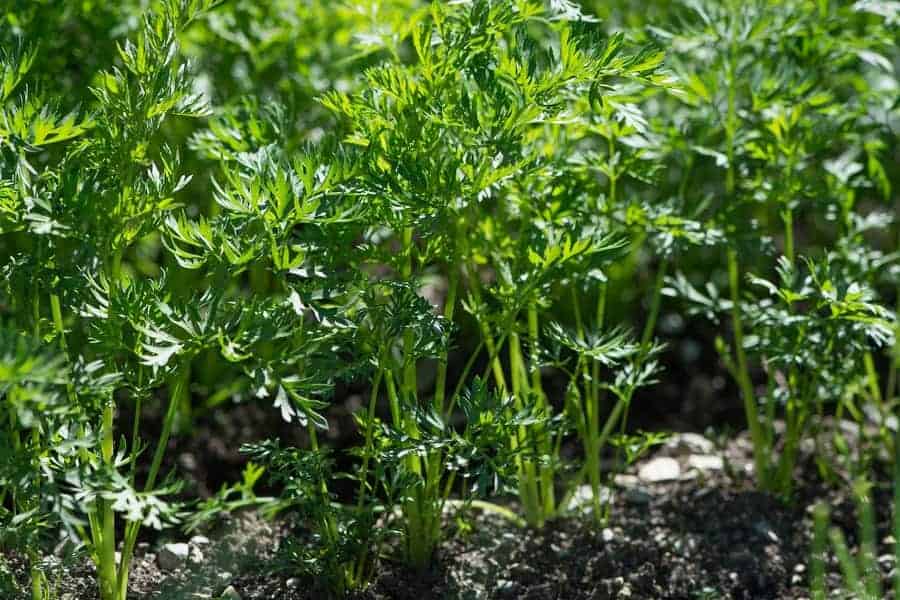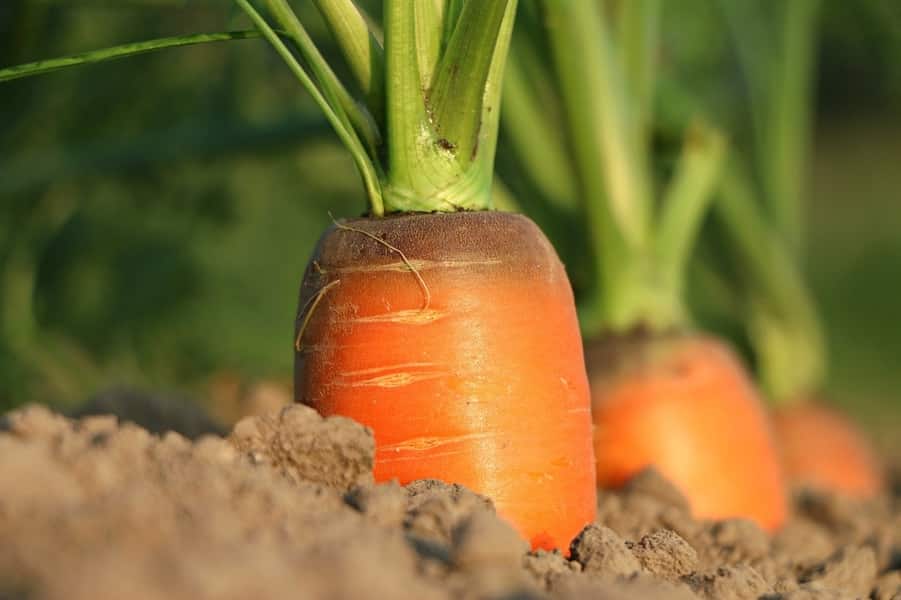Carrots are a nutritious snack that only requires a little effort when growing. They’re a good source of Vitamin A, folate, potassium, and magnesium. Many of us would like to start gardening, and including carrots is a must in every garden. Here we will focus on the carrot germination time and all the process details. Also, we will discuss how you can speed up the process.
What temperature do you need to germinate carrots? What type of soil and how much water does a carrot need to be planted? Where should you plant carrots? What is the carrot germination time? All these questions have one standard answer; it depends. We have a lot of factors that will determine each point. Let’s dig into it.
Carrot seeds take between 15 and 21 days to germinate, depending on the soil temperature and water availability. Prolonged exposure to wet conditions and temperatures ranging from 10-15 °C is optimal. However, as you know, we like to educate in this blog and not just spit out answers. We must know the main factors that affect germination to adjust and have a clear roadmap if things are not working.
Seed Viability or Seed Health
Seed viability is the period during which the seed retains the ability to germinate. It is a variable period and will depend on the type of seed and the storage conditions.
The seeds lose the ability to germinate generally as time passes and could decline rapidly if the storing conditions are poor.
In general, young seeds germinate quickly; on the contrary, old seeds germinate slowly and irregularly.
On the other hand, the seed will retain its ability to germinate longer when the metabolism is less. To slow down the metabolism of the seed, it is enough to lower the storage temperature and/or dehydrate it. Still, always within limits, since below 2-5% humidity, the seeds will be affected.
Humidity
The absorption of water by the seed is the first and most crucial step, which takes place in the germination process; it is necessary to rehydrate its tissues to recover and activate the metabolism.
Water is essential for germination, and it must be considered that both a deficit and excess will have negative consequences. In extreme cases could prevent germination or at least negatively affect the amount of seed germinated.
Due to the thick layer that carrot seeds have, they must be in constant contact with a humid environment to penetrate and start the germination process.

Temperature
Temperature is the most critical environmental factor regulating germination and controlling seedling growth. This factor is decisive because it influences the enzymes that regulate the speed of the biochemical reactions that occur in the seed after rehydration.
For each species, there is a range of temperatures within which the germination of its seeds can take place. This range is defined by a maximum temperature and a minimum temperature, above or below which germination does not occur.
Within this temperature range is also the optimum germination temperature, which can be defined as the most suitable temperature to obtain the highest germination percentage in the shortest possible time.
In the case of carrots, the temperature range is quite broad; the content goes from 7-30 ° C (45-85 ° F), with 10-15 ° C being the optimal range.
Aeration
Good gas exchange between the environment and the seed is essential for rapid and uniform germination. Oxygen is necessary for the respiration process of germinating seeds.
Light
Light can affect germination depending on the species in different ways. The effect that light has on the seeds will allow them to be classified into different categories:
Seeds with positive photosensitivity are the seeds that germinate, preferably under lighting.
Seeds with adverse photosensitivity are seeds that germinate preferentially in the dark.
Non-photosensitive seeds are seeds that germinate regardless of lighting conditions.
In this case, the carrot belongs to the first group; it preferably germinates under lighting.
Stages of the Germination Process – Carrot germination time
Hydration Phase
The first stage that takes place during the germination process is the absorption of water by the seed. Without this stage, the germination process cannot occur.
After the seed absorbs water, a number of metabolic reactions start to occur which are necessary for the subsequent stages of germination.
Some factors that can influence this germination stage include the deficit or excess of water in the environment surrounding the seed, the rate of hydration, and the temperature at which the imbibition takes place.
Germination Phase
Once the seed has completed the hydration phase, it enters the second phase of the germination process, called the germination phase in the strict sense. It is so named because it represents the actual germination process. In this phase, water absorption is considerably reduced, even coming to a halt.
Growth Phase
It is the last phase of the seed germination process. It is characterized by increased water absorption, as well as increased respiratory activity. The extension of the radicle through the seminal envelopes is the fact that it supposes the end of the germination phase itself and marks the beginning of this third and last phase of the germination process.
While in the first two phases of germination, the processes are reversible, the seeds that reach the growth phase cannot return to the previous stages; that is, they enter an irreversible physiological situation, and if the right conditions are not given so that this phase can continue, the seed will die.
Carrot Germination Time
The carrot takes between 14 and 21 days to germinate and emerge from the ground because the seed has a relatively thick outer layer; due to this characteristic, the seed must be in a constant humidity environment.
Carrots germinate best in warm and moist soil. Keeping weeds in check for the first few weeks is essential as they are highly susceptible to competition.
If you want to speed up the process in a certain way or we don’t have enough time to water daily, consider covering the row or container with transparent polyethylene plastic; this will heat the soil and conserve moisture. We must remove the plastic immediately when the first seedlings appear.

How to Speed Up the Germination
To advance germination, we carry out “pre-germination,” which consists of soaking the seed in a warm place three days before sowing.
After 3 days, we place two sheets of absorbent kitchen paper or a piece of cotton cloth over a large strainer and let the water drain.
Next, the strainer, the paper, and the seeds are put in an airy place so that the greatest amount of water dries out; we must place the seeds in the shade, never in the sun. Within a few hours, the seeds are ready for sowing.
The idea behind this is to expose the seeds for a long time to a wet environment so that they absorb as much water as possible. This should shorten germination by 4-5 days.
Wrapping Up – Carrot germination time
The carrot germination time is around 14-21 days, a very long period comparting with other seeds, mainly due to the hard skin surrounding the embryo. Numerous aspects can affect and restrict the sprouting period, with water being the most crucial factor to consider.
To speed the process up, you can implement a pre-germination process by soaking the seeds in a warm place for 3 days and later drying them up in the shade.

